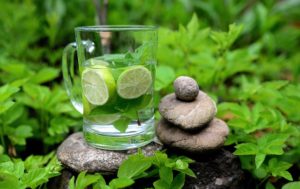Quick! What’s the most important nutrient that you need to consume several times each day? If you guessed protein, Vitamin C or calcium, you’d be wrong. It’s water.
Even though water isn’t a vitamin or mineral, it’s a nutrient that’s vital to human life. If you think otherwise, consider this; you can live for weeks without food, but only for about three days without water. It’s considered essential because your body needs more than it can produce on its own. That’s because you lose a lot of water each day through evaporation, elimination, respiration, and sweat. Water is an incredible workhorse in so many ways. Here are just some of the things it does to keep you healthy:
-Water helps you maintain the balance of fluids in your body. You’re made up of about 60 percent water, and when you become oversaturated, you lose water through urination. If you’re dehydrated, your brain signals you to drink more by signaling thirst.
 -Water helps to regulate your body temperature through the evaporation of sweat.
-Water helps to regulate your body temperature through the evaporation of sweat.
-The water content in your food actually helps you to control calories. Foods that contain a lot of water, such as fruits, vegetables, and soups are more filling than foods with low water content, and eating water-heavy foods help signal your body to stop eating.
-Water supports your digestion and keeps your bowels moving.
-In your joints, water in the form of joint fluid acts as a cushion to help absorb shock and to slow down wear and tear.
-Water is a fundamental component in controlling your blood pressure.
-Your brain is more watery than your body, consisting of 73 percent water. When you become dehydrated, it can affect your mood, decrease cognitive function, affect your memory and make you more sensitive to pain.
-Water helps boost your immunity by flushing toxins from your body and ushering oxygen to all your cells. Remember it’s the O for oxygen in H2O.
-Want healthier looking skin? Drink up. Well-hydrated skin is plump and glowing, while dehydration makes your skin look dry and wrinkled, and it slows down wound healing.
-Water regulates the balance of electrolytes in your body, which include sodium, potassium, chloride, and bicarbonate. These electrolytes help  regulate the function of your nerves and muscles and help you maintain the acid balance (pH) in your body.
regulate the function of your nerves and muscles and help you maintain the acid balance (pH) in your body.
-Staying hydrated prevents headaches, muscle cramping, and sprains and strains, as dehydrated tissues are more prone to injury.
How much water should you drink each day? It depends. Experts recommend somewhere between four and eight cups (8 oz. per cup) daily, depending on the medications you’re taking, physical activity, age, and overall health. While your brain will ultimately tell you when you’re dehydrated, don’t depend on thirst as a gauge for when to drink. Thirst signals actually decrease as you age, so as you get older, you need to make sure you’re getting enough water, regardless of whether or not you’re thirsty.



